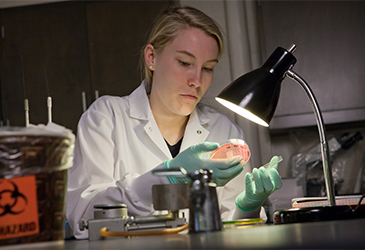Dr. Nilanjan Lodh
Dr. Lodh’s current research interests lie in improving diagnosis of human schistosomes and the enigmatic human Strongyloides using parasite species-specific DNA detection by PCR from urine sediments captured on filter paper. This work was successfully done in collaboration with Zambian colleagues for Schistosoma mansoni and for both S. mansoni and S. haematobium with colleagues from Ghana. Now he is using loop mediated isothermal amplification (LAMP) to enable this technique to be more adaptable to field conditions. The above mentioned approach has been extended to detect Strongyloides stercoralis from urine sediment along with Argentine colleagues. As a young researcher working on neglected tropical diseases (NTDs), it is important to develop more sensitive and specific test for NTDs especially on Schistosomiasis, Strongyloidiasis and other soil-transmitted helminths (STHs).
Dr. Erik Munson
Dr. Munson’s research laboratory investigates the diagnosis of sexually-transmitted infections (STI). Monitoring STI agent detection rates in a high-prevalence STI community is not only important from an epidemiologic perspective, but also in the context of novel assays designed for diagnosis of emerging STI agents.
An additional research interest of the laboratory is regional surveillance of antimicrobial resistance in clinically-significant bacteria. A recent evaluation of Wisconsin antimicrobial susceptibility patterns has revealed geographic and temporal differences in selected antibiotic/organism combinations. Annual surveillance of these differences can assist clinical practice at the level of pharmacy, infectious disease, clinical microbiology, and antibiotic stewardship initiatives.

